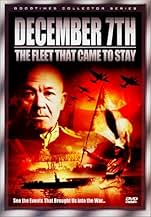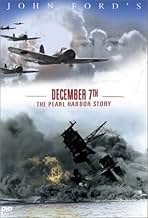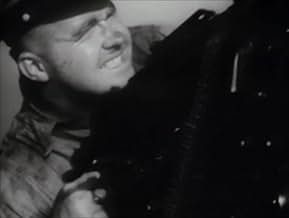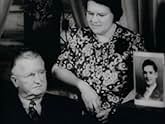Uno sguardo dietro il passato sul bombardamento di Pearl Harbor del 7 dicembre 1941 e le sue conseguenze, il recupero delle navi, il miglioramento della difesa alle Hawaii e gli sforzi degli... Leggi tuttoUno sguardo dietro il passato sul bombardamento di Pearl Harbor del 7 dicembre 1941 e le sue conseguenze, il recupero delle navi, il miglioramento della difesa alle Hawaii e gli sforzi degli Stati Uniti per respingere i rinforzi giapponesi.Uno sguardo dietro il passato sul bombardamento di Pearl Harbor del 7 dicembre 1941 e le sue conseguenze, il recupero delle navi, il miglioramento della difesa alle Hawaii e gli sforzi degli Stati Uniti per respingere i rinforzi giapponesi.
- Vincitore di 1 Oscar
- 1 vittoria in totale
- Narrator
- (voce)
- (as James K. McGuiness)
- Shinto Priest
- (non citato nei titoli originali)
- Self
- (non citato nei titoli originali)
- Reporter
- (non citato nei titoli originali)
- Wounded Officer
- (non citato nei titoli originali)
- Self
- (filmato d'archivio)
- (non citato nei titoli originali)
- Self
- (non citato nei titoli originali)
- Self
- (non citato nei titoli originali)
- Self
- (non citato nei titoli originali)
- Self
- (non citato nei titoli originali)
- Hawaiian Boy
- (non citato nei titoli originali)
- Pvt. Joseph L. Lockhart
- (non citato nei titoli originali)
Recensioni in evidenza
Short Version: Dated recreation of the bombing of Pearl Harbor is best viewed in context of its time
I'm of mixed minds about the film. Certainly the recreation of the bombing is stunning and had I seen this film back in the 1940's I would have been floored by it since its often a great mix of almost believable Hollywood magic and real life footage. Its so good that its clear that later recreations of the attack like Tora Tora Tora and Pearl Harbor stole shots and sequences from it. Unfortunately these same films, freed of the shackles of having to be a propaganda puff piece, are more interesting to watch. We can get lost in the story and don't need to have our patriotism pumped up.
Its not bad, its just more a curio that should be viewed in context of when it was made rather than as a piece of entertainment or a source of real information on the subject.
Worth a look for those who want to see a snapshot of how the war was viewed during the war, or for those cine-files who want to see where later movies cribbed their shots.
Anyway, this makes a much better attempt to tell the whole story than THE BATTLE OF MIDWAY (one imagines the feature being that more comprehensive in this regard!), and only resorts to mawkishness – albeit movingly done regardless – towards the end i.e. when the fallen soldiers 'introduce' themselves to the audience. Needless to say, the Japanese side is depicted in strictly caricatured terms (which was the accepted norm for the duration of the conflict, seen also in contemporary cartoons!) but, while a Japanese civilian (sympathizing with the invasion) is interviewed, we also get to see how other naturalized Orientals hid evidence (not just store-signs but the Asian calligraphy itself!) of their old country in shame. Again, a number of stars lend their services to provide the accompanying narration: I recognized Walter Huston's voice in this streamlined copy but, reportedly, the likes of Harry Davenport and Dana Andrews were also involved.
*** 1/2 (out of 4)
John Ford's highly entertaining recreation of Pearl Harbor and the events after it certainly deserved the Academy Award win it received for Best Documentary Short. The film mixes recreated scenes very well with actual footage and I'd go as far to say that the battle scenes (done with models) are among the best from any war film of the period. The version I watched was the original, 34-minute theatrical version.
All of Ford's WW2 shorts are worth seeking out as well as the film's done by Frank Capra during this period.
Lo sapevi?
- QuizTurner Classic Movies showed the original uncut "censured" version of this movie on 15 September 2015. During the introduction with Ben Mankiewicz and Mark Harris, one of many reasons why the movie was censored was in 1943 it was considered too racist against the Japanese.
- BlooperShowing the events of the Sunday morning attack, the priest at Mass (at Kaneohe, I believe) announces incorrectly that it is the 1st Sunday of Advent. Actually it was the 2nd Sunday of Advent.
- Citazioni
World War I Ghost Soldier: Six will get you twelve that fifteen to twenty years from now they'll be opening up new sectors in here.
- Curiosità sui creditiThe War and Navy Departments, producers of the movie, are credited orally by a narrator.
- Versioni alternativeSpecial 50th anniversary edition on video released in 1991 is restored to 82-minute length with subtitles added to Japanese language sequences and a descriptive prologue added. The 1943 version was a completely censored 34-minute version with the full version being banned by the US government for being damaging to morale.
- ConnessioniEdited into Aquile del mare (1949)
- Colonne sonoreColumbia, the Gem of the Ocean
Written by David T. Shaw
Arranged by Thomas A. Beckett
Played as background music often
I più visti
Dettagli
- Tempo di esecuzione
- 1h 22min(82 min)
- Colore
- Mix di suoni
- Proporzioni
- 1.37 : 1
























